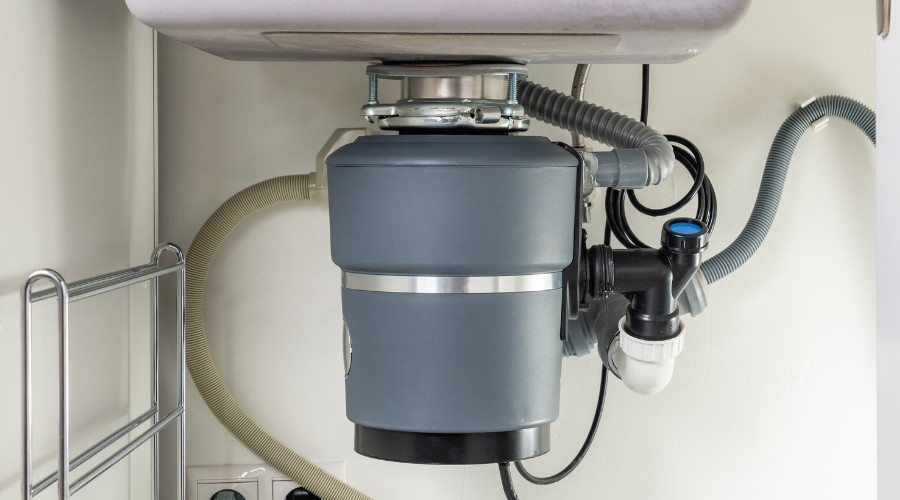How to Care for the Garbage Disposal and Prevent Clogs
A garbage disposal is a workhorse in many kitchens, grinding food scraps and helping keep sinks clear. However, misuse or neglect can quickly lead to a clogged garbage disposal, foul odors, or even deeper plumbing problems, such as a sewer line clog. This post explains how to care for a garbage disposal and prevent clogs, with an overview of what should and should not go into the unit, how cold water and ice support a clean garbage disposal, and why avoiding overloads protects both the disposal and drain system.
Be Careful What Goes Down the Disposal
 The easiest way to keep a garbage disposal running smoothly is to control what enters it. Certain materials are notorious for causing jams, damage, or clogs in the drain and even contributing to a clogged sewer line. Grease, fats, and cooking oils should never be poured into a garbage disposal. These substances cool and harden on pipe walls, trapping other particles and gradually building a stubborn blockage.
The easiest way to keep a garbage disposal running smoothly is to control what enters it. Certain materials are notorious for causing jams, damage, or clogs in the drain and even contributing to a clogged sewer line. Grease, fats, and cooking oils should never be poured into a garbage disposal. These substances cool and harden on pipe walls, trapping other particles and gradually building a stubborn blockage.
Eggshells, potato peels, onion skins, and other fibrous scraps tend to tangle around internal components, reducing performance. Foods that absorb and retain water—such as rice, pasta, bread, and oats—can swell in the drain and contribute to clogs. Coffee grounds form dense, sludgy deposits that cling to pipes and disposal parts. Hard items like bones, fruit pits, nutshells, and any non-food debris can damage grinding components and should always go in the trash instead.
On the safe side, small quantities of soft food scraps, cut into modest pieces, are generally suitable when combined with plenty of cold water. Scraping most leftovers into the trash or compost first, then rinsing residual particles through the garbage disposal, reduces the risk of a clogged garbage disposal and helps protect the main line from becoming a clogged sewer line.
Use Cold Water and Ice
 Water temperature and flow play a major role in disposal health. Running cold water before, during, and for several seconds after using the garbage disposal helps flush particles through the drain system. Cold water keeps any residual fat in a more solid state, allowing the grinding action to break it into tiny fragments rather than letting it melt and coat pipes. This practice supports both cleaner plumbing and more reliable operation.
Water temperature and flow play a major role in disposal health. Running cold water before, during, and for several seconds after using the garbage disposal helps flush particles through the drain system. Cold water keeps any residual fat in a more solid state, allowing the grinding action to break it into tiny fragments rather than letting it melt and coat pipes. This practice supports both cleaner plumbing and more reliable operation.
Periodic cleaning with ice cubes can also promote a clean garbage disposal. Feeding a small handful of plain ice cubes into the unit and running it briefly helps knock loose food particles and residue from the grinding chamber and internal surfaces. The ice chips act like tiny scrubbing tools, dislodging buildup that might otherwise lead to odor or reduced performance.
If the disposal becomes jammed, common signs include a garbage disposal humming without grinding or failing to start until the garbage disposal reset button is pressed. While an occasional reset may be normal after a jam, frequent humming, stalls, or repeated trips of the reset button often indicate the need for professional garbage disposal repair. In some cases, extensive wear or damage makes garbage disposal replacement the most practical option.
Avoid Putting Too Much Down the Disposal at Once
Even suitable food waste can cause trouble if too much is fed into the disposal at once. Overloading the chamber with large quantities of scraps can overwhelm the motor and grinding components, increasing the likelihood of a jam or stalled operation. This often results in a garbage disposal humming without turning on, and in difficult situations, can push unprocessed debris deeper into the plumbing, contributing to a sewer line clog.
To prevent overload, large food items should be cut into smaller pieces before reaching the sink. These smaller pieces can then be introduced gradually while the disposal runs, always accompanied by a steady stream of cold water. Allowing the unit to finish grinding one batch before adding more reduces stress on the motor and ensures that particles are broken down thoroughly enough to pass through the drain system.
Paying close attention to drainage speed, noises, and odors can catch early warning signs of trouble. Slow-draining sinks, persistent smells, or repeated jams suggest that maintenance or garbage disposal repair is needed before a minor issue escalates. In this way, good daily habits and timely service work together to keep the disposal and the broader plumbing system functioning reliably.
About Reeves Family Plumbing
Reeves Family Plumbing is, as the name suggests, a family-owned and operated plumbing company proudly offering expert service to the people of Dallas and the neighboring communities. With their top source of business being referrals, and offering prompt service and fast turnarounds, customer satisfaction is guaranteed. Call them today for kitchen plumbing and garbage disposal services in Dallas, TX.



